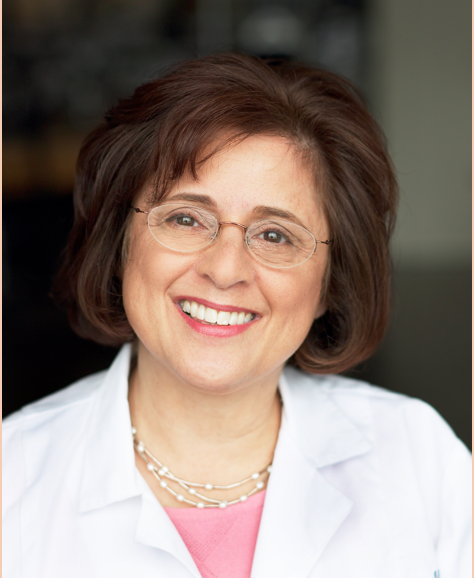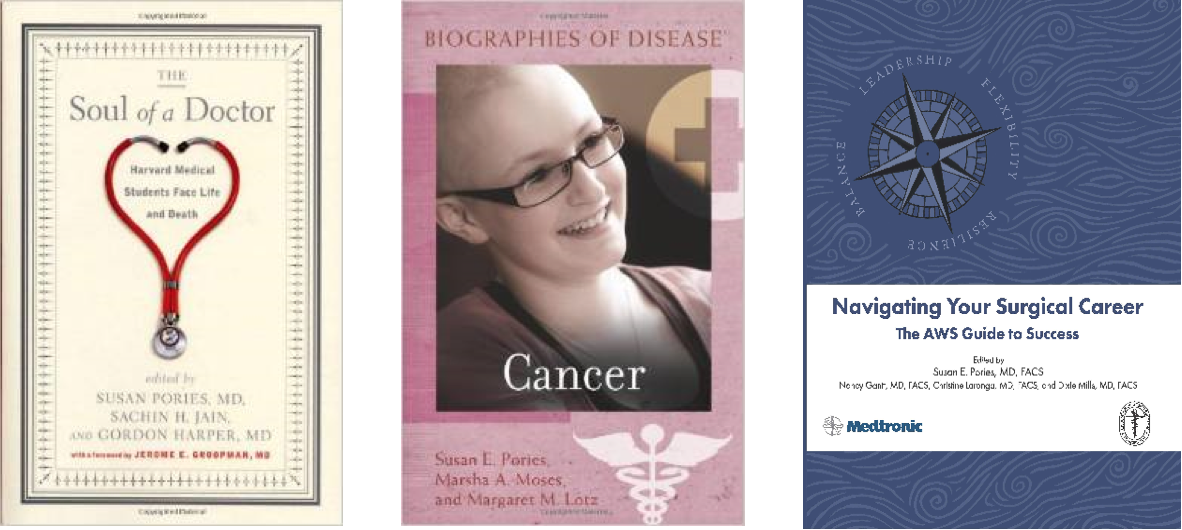Interview with Susan Pories, MD

Susan Pories is a surgeon, writer, and editor at the Mount Auburn Hospital, and a Co-Director of the Arts and Humanities Initiative at Harvard Medical School. Thirdspace spoke with her and learned about her previous career as a teacher, and how her interest in the arts led her on a journey that brought her to medical school.
Please tell us about yourself.
I’m a breast surgeon at the Mount Auburn Hospital and I’m the medical director of the Hoffman Breast Center. I’ve been in practice for over 20 years.
How did you get to this hospital?
I did most of my training at the University of Vermont. I did my undergraduate work there, as well as medical school, and my surgical residency. I married a Vermonter and so I thought we were going to stay in Vermont, because my husband’s kind of a homebody and his family was there, but we moved to Boston for my oncology fellowship. We were planning on going back to Vermont after fellowship but as it ended up we stayed in Boston. I started out with a general surgery practice. However, because I was one of the only women surgeons in Cambridge at the time, I treated many women with breast cancer and after a while I decided to limit my practice to breast surgery.
What do you like about the field of breast surgery?
I imagine whatever specialty you’re in, the part that is really rewarding is to get to know the patients and their families. Every surgical procedure becomes fairly routine after awhile. There are always going to be interesting and challenging cases that require problem solving and a lot of thought. But most of the time, it's about the relationship with the patients. And the stories of women battling breast cancer are very compelling in many ways. I like the stories. It’s narrative and stories that got me interested in the arts as well.
Can you tell me more about that?
Before I went to medical school I was actually an English and art teacher. That was my plan – to be a teacher. But I decided to switch directions after a couple of years. I’ve always been interested in reading. I love to read, I like to write, and I do really like to edit too.
How did your career path change from being an English and art teacher to medicine?
My dad was a surgeon so I was always exposed to medicine. When I was a little girl, he always took me on rounds with him. It was always a positive experience because he was a German immigrant and after we’d go to the hospital we’d always go to the German bakery or the delicatessen and I’d get a little treat from the shopkeeper. So it was positive reinforcement. Originally, when I was younger I wanted to be a doctor, a surgeon like my dad. But as I got older I lost my confidence as teenagers or young women sometimes do. I felt like I couldn’t make it into the medical field. My mom was a teacher and I thought that would be a better alternative for me. There weren’t many women going into medicine then.
My first teaching job was teaching migrant children in upstate New York. It was a tutorial position where I worked with students one on one. This was such an interesting experience because these kids and their families travelled from NY to Florida and back again to follow the seasonal crops. They really had a pretty rough life. And they were never in the same school for very long, so a lot of them never learned to read. Some of these kids were teenagers, and they were very embarrassed about being illiterate. I used an approach where the students use their own stories to learn how to read.
Ultimately I decided, to look for a different direction and was still interested in medicine. So I took a job at an OB-GYN office during the day. At night, I volunteered at a free clinic in Vermont. A lot of the other volunteers ended up going to medical school. When I was working in the OB clinic one day, a friend of mine who had been at the free clinic with me was assigned to rotate through the OB office where I was working. I thought: “If he can do this - then I can do this.” That day I decided to go through medical school. I quit my job, took out loans, took all the premedical courses in a year and then applied to medical school.
Could you tell me about how you first got interested in creative writing and editing?
I got involved with the writing group for medical students as a tutor in the Patient-Doctor III course at HMS. At the time, all the medical students used to come back from their hospital assignments every week for a lecture about a topic that was separate from basic sciences – such as ethics, social sciences, politics, or health policy. Afterwards we would break out into small groups and have discussions. Three times a year, students had to write reflective papers about their experiences. The student papers were incredibly thoughtful and thought provoking. So along with Gordon Harper, the course director, and Sachin Jain, one of the students, we decided to publish some of the essays as a book. And that was the first book I edited – The Soul of a Doctor: Harvard Medical Students Face Life and Death, which was published in 2006. That was very gratifying.
My second book Cancer: Biography of a Disease, was written with Dr. Marsha Moses, Director of the Vascular Lab at Children’s Hospital, and Dr. Margaret Lotz, a cancer researcher I worked with when we were fellows in the Program Project Grant for colon cancer at the New England Deaconess Hospital. This book was written for a lay audience and was designed to help high school students learn about cancer.
I also edited a book for young surgeons called Navigating Your Surgical Career: The AWS Guide to Success. I recruited prominent women surgeons from all over the country to write chapters about topics that would help young surgeons, such as how to interview, how to structure a CV, how to choose your first job, managing finances, setting up a practice, and so forth.. The impetus for doing this project was my experience as President of the Association of Women Surgeons (AWS). As AWS President, young women surgeons, residents, and medical students from all over the country contacted me for help and advice. One young intern emailed me and asked for help finding a job. I hadn't met her, but agreed to help. I thought it was unfortunate that a young woman who was hardworking, bright, and accomplished enough to make it into a surgical residency wasn’t getting the mentoring she needed from her own Program director. I realized that many young surgeons in smaller programs all across the country, and even around the world were not getting the mentoring they needed. So that inspired me to take on this project. I asked each of the distinguished and experienced surgeons who wrote chapters to write in a conversational friendly tone as if they were having a cup of coffee with a mentee. This book has been recognized as an invaluable resource for all young surgeons, both men and women.
The next book, The Soul of a Patient: Lessons in Healing for Harvard Medical Students will be coming out soon. This is a compilation of mentored case books by first year students.
It seems like there weren’t many opportunities for exposure to the arts when you went to medical school, but now you’re making it more possible for current medical students, as a leader of the Arts and Humanities Initiative at HMS.
Of course, medical school is primarily science-based and is focused on the care of the patient. The most important job of every medical student is to learn to be the best doctor that they can be. But one of the things I believe very strongly is that exposure to the arts and humanities can make you a better doctor, even though it's not part of the core curriculum yet. Music and art can be used to restore yourself, express yourself, understand yourself and your patient, or the relationship you have with the patient. It’s not always for publication; it’s not always for performance. That’s not the goal of our Arts and Humanities Initiative. It’s really for your growth and reflection.
It’s a life-changing experience to go to medical school. You are very different when you put on that white coat; you take on a lot of responsibility. Your patients will come before everything else most of the time. Once you put on the white coat and you become a physician, your patient comes first. You may not be able to do all the things you used to do. But there still has to be time to take care of yourself. In the end you will be a better doctor if you can fit a little time in your day to do some writing, if that’s what nurtures you. Or maybe it’s playing your violin, dancing, or playing your guitar. You know, not everyone’s an artist – maybe it’s reading poetry or listening to music. But everyone needs time for renewal. Even though our patients come first, you do have to nurture yourself to remain an empathetic physician.
Do you think the creative arts help with clinical skills?
Yes, I think they do. There are certain things in medicine that you can diagnose visually, if you take the time to look and take the time to really reflect. The same thing is when you really listen to a patient. I think that’s where the arts can teach you to really slow down and look. Listening carefully to a patient will also lead you to a diagnosis - not only listening to their heart and lungs, but also listening to their story. Not just asking in a rote way, but really listening.
What is some advice you would give to a medical student or a medical professional about incorporating the arts and humanities in their daily lives or careers?
The arts really enrich you and I encourage everyone to try to engage with the arts any way they can. Whether it’s just enjoying the arts or learning to participate in the arts - it can enrich your practice and your personal life.

